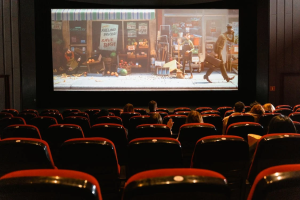The Rise of Theater: From Ancient Greece to the Cinema

source: https://www.pexels.com/fr-fr/photo/musique-piece-spectacle-dessin-anime-7991579/
Theater has been an integral part of human culture for thousands of years. From Ancient Greece to the present day, theater has been used to tell stories, express emotions, and bring people together. It has evolved and adapted to changing times, as well as different cultures and countries. As the world has become more industrialized and technology has advanced, theater has had to compete with the cinema for audiences, just like physical casinos and horse races now compete with the best sportsbook online. Despite this, theater is still popular today, and continues to be a powerful way to communicate. This paper will look at the development of theater from its beginnings in Ancient Greece to its current status in the 21st century, as well as how it has been impacted by the rise of the cinema.
The Origins of Theater: Ancient Greece
Theater has its origins in Ancient Greece. The first plays were written and performed in Athens in the 5th century BC. These plays were part of religious ceremonies, and were used to honor the gods. Theater became an important part of Greek culture, and the plays were seen as a way to educate and entertain the citizens. Greek theater was popular throughout the region, and had a major influence on the development of theater in other parts of the world.
Theater in the Middle Ages: Europe and Asia
During the Middle Ages, theater continued to develop and evolve. In Europe, theater was used to express religious and political ideas, as well as to entertain. Theater was also popular in Asia, particularly in China and Japan, where it was used to tell stories and teach moral lessons. Theater was also used to spread religious teachings, and many plays were based on Buddhist and Hindu stories.
The Renaissance and the Rise of the Theater
The Renaissance was a period of great cultural and artistic growth in Europe. Theater became more popular, and plays began to be written about more secular subjects. Shakespeare was one of the most famous playwrights of this period, and his plays are still performed today. The popularity of theater in Europe continued to grow, and it became an important part of the culture.
Theater in the 19th and 20th Centuries
In the 19th and 20th centuries, theater continued to be popular in Europe and the United States. In the United States, theater was used to tell stories about American culture, and many of these plays still hold a place in the American theater canon. In Europe, theater was used to express new ideas and challenge the status quo.
The Impact of the Cinema
With the invention of the cinema in the late 19th century, theater was suddenly faced with competition for audiences. Movies were easier and cheaper to produce, and allowed for more elaborate special effects than theater. As a result, theater attendance began to decline, and many theaters closed. This trend has continued into the 21st century, and the rise of streaming services has further impacted the theater industry.
The Resurgence of Theater in the 21st Century
Despite the competition from the cinema, theater has not disappeared. In fact, theater has seen a resurgence in popularity in the 21st century. In the United States and Europe, theater is still popular, and there are many theaters producing new plays every year. In addition, theater has become more accessible to people in other parts of the world, particularly in Asia and Africa.
The Rise of Streaming Movies: The New Way to Consume Cinema
The 21st century has seen a shift in the way people consume media, with streaming services such as Netflix and Hulu becoming increasingly popular. These services allow users to watch movies and television shows from anywhere, and at any time. This has drastically changed the way people watch movies, with people no longer needing to go to the cinema to see the latest releases. Streaming has also led to the rise of television series and made them more popular than ever before. Series provide an ongoing story and characters that viewers can invest in and follow, and this has had an impact on the way people consume cinema.
Conclusion
Theater has been an integral part of human culture for thousands of years, and its influence can still be felt today. From its beginnings in Ancient Greece to its current status in the 21st century, theater has evolved and adapted to changing times and different cultures. Despite the rise of the cinema, theater is still popular today, and continues to be a powerful way to communicate. The rise of streaming movies has also changed the way people consume cinema, and the popularity of series has had an impact on the theater industry. Despite the challenges posed by the cinema, theater remains an important part of our culture, and its place in our society is secure.

